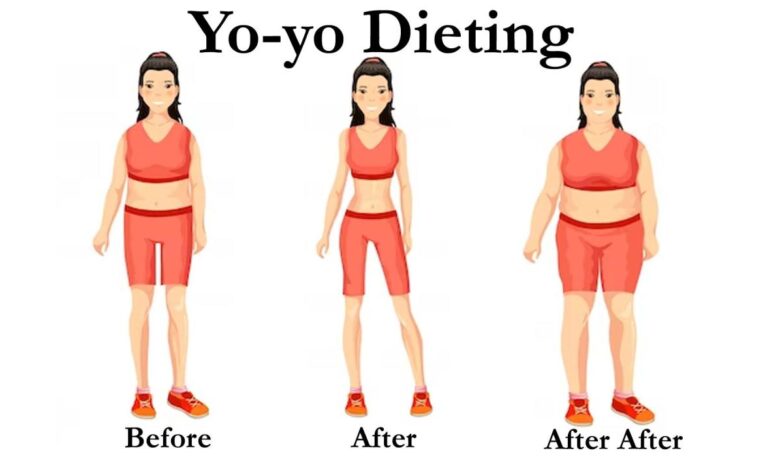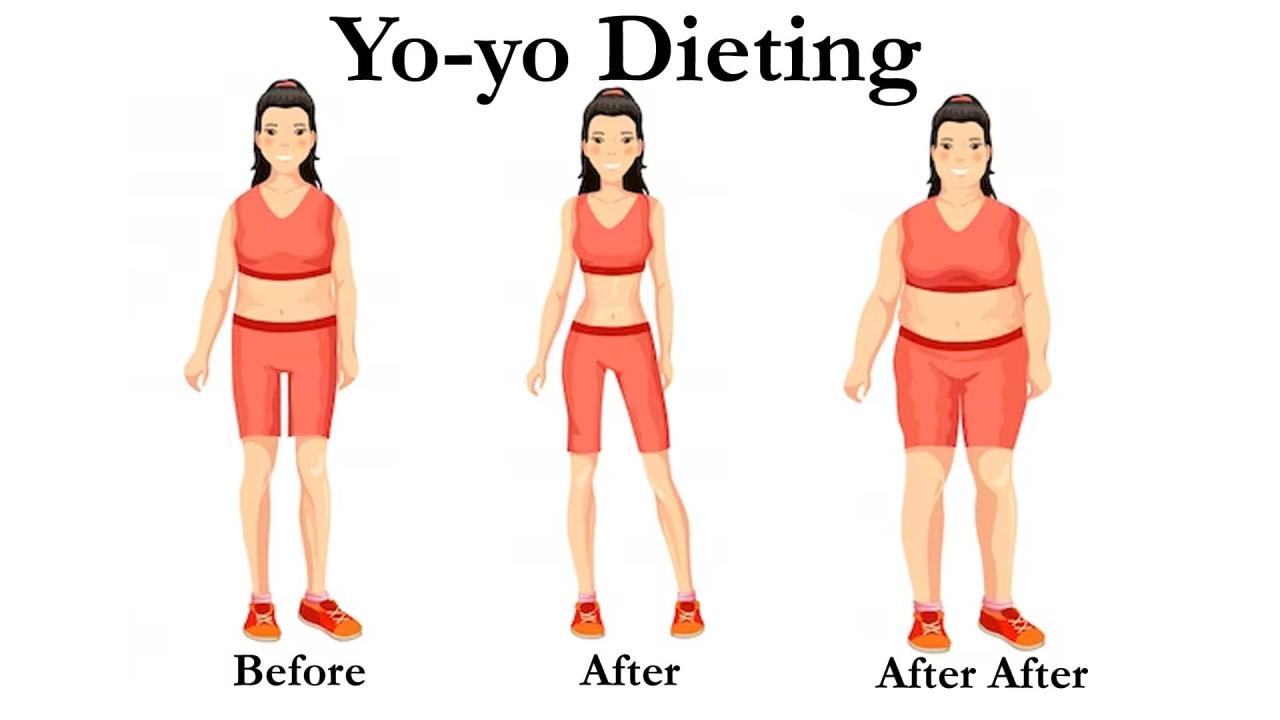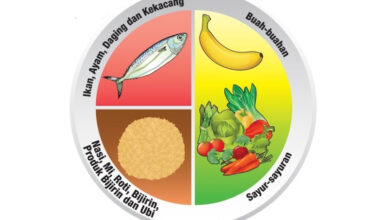
Yo-Yo Dieting: The Negative Impact on Your Muscles
The negative impact of yo yo dieting on your muscles – Yo-yo dieting, the cycle of drastic weight loss followed by regain, can wreak havoc on your body, particularly your muscles. While you might be happy with the initial weight loss, the long-term effects on your muscle mass and overall health can be detrimental.
Imagine a rollercoaster ride for your body, where the ups and downs of weight fluctuations leave you feeling depleted and less resilient.
This repeated cycle of calorie restriction and overeating disrupts the delicate balance of hormones that regulate muscle growth and breakdown. It’s like trying to build a house with shaky foundations – you might see some progress initially, but eventually, the whole structure starts to crumble.
The Science Behind Muscle Growth and Loss
Understanding how muscles grow and shrink is crucial for appreciating the impact of yo-yo dieting on your physique. It involves a complex interplay of protein synthesis, breakdown, and hormonal influences.
Muscle Protein Synthesis and Breakdown
Muscle protein synthesis (MPS) refers to the process of building new muscle tissue, while muscle protein breakdown (MPB) involves the breakdown of existing muscle protein. Both processes occur simultaneously, and the balance between them determines whether muscle mass increases or decreases.
The rate of MPS is higher when you engage in resistance training and consume adequate protein, while MPB is elevated during periods of inactivity, calorie restriction, or prolonged stress.
The Role of Hormones in Muscle Growth
Hormones play a critical role in regulating muscle growth. Testosterone, a male sex hormone, is essential for promoting MPS and muscle strength. Growth hormone, produced by the pituitary gland, also contributes to muscle growth by stimulating protein synthesis and reducing MPB.
Calorie Restriction and Muscle Mass
Calorie restriction, a hallmark of dieting, can negatively impact muscle mass. When you consume fewer calories than you burn, your body enters a catabolic state, where it breaks down muscle tissue for energy. This is exacerbated by yo-yo dieting, where periods of calorie restriction are followed by periods of overeating.
Calorie Surplus and Muscle Mass
A calorie surplus, where you consume more calories than you burn, is generally conducive to muscle growth. However, this is only true if you engage in resistance training and consume sufficient protein. Without these factors, excess calories are likely to be stored as fat.
The Yo-Yo Dieting Cycle and Its Impact on Muscles
The yo-yo dieting pattern, characterized by alternating periods of strict calorie restriction and subsequent overeating, is a common approach to weight loss. However, this cyclical pattern can have detrimental effects on muscle mass and overall health.
The Yo-Yo Dieting Pattern
Yo-yo dieting is a cycle of weight loss followed by weight regain, often repeating over an extended period. It involves periods of intense calorie restriction, leading to rapid weight loss, followed by periods of overeating, resulting in weight regain. This cycle can be triggered by various factors, including social events, holidays, or simply the inability to sustain strict dietary restrictions.
Hormonal Disruption and Muscle Growth
Rapid weight loss and gain associated with yo-yo dieting can disrupt hormonal balance, impacting muscle growth and repair. During periods of calorie restriction, the body enters a catabolic state, breaking down muscle tissue for energy. This process is mediated by the hormone cortisol, which is elevated during periods of stress, including calorie restriction.
Cortisol promotes muscle breakdown and inhibits muscle protein synthesis, hindering muscle growth.
Muscle Atrophy and Loss of Strength
Periods of calorie restriction can lead to muscle atrophy, a decrease in muscle mass and size. This occurs because the body prioritizes energy conservation during periods of limited calorie intake, leading to a reduction in muscle protein synthesis. As a result, muscle fibers become smaller and weaker, leading to a decline in strength and overall physical function.
The Metabolic Effects of Yo-Yo Dieting: The Negative Impact Of Yo Yo Dieting On Your Muscles

Yo-yo dieting, characterized by repeated cycles of weight loss and regain, can have a detrimental impact on your metabolism, making it harder to lose weight in the long run. This is because your body adapts to these fluctuations in energy intake, leading to metabolic changes that can work against your weight loss efforts.
Metabolic Adaptation
Your body is remarkably adaptable, striving to maintain a stable internal environment called homeostasis. When you repeatedly lose and regain weight, your body learns to conserve energy more efficiently, making it harder to shed those extra pounds. This metabolic adaptation occurs through various mechanisms:
- Decreased Basal Metabolic Rate:Your basal metabolic rate (BMR) is the number of calories your body burns at rest. When you restrict calories, your BMR naturally decreases to conserve energy. This reduction in BMR can persist even after you return to your usual eating habits, making it harder to lose weight in the future.
- Increased Leptin Resistance:Leptin is a hormone that signals to your brain that you are full. When you yo-yo diet, your body can become resistant to leptin, meaning your brain doesn’t receive the fullness signals as effectively. This can lead to increased hunger and cravings, making it difficult to stick to a healthy diet.
- Changes in Gut Microbiome:The bacteria in your gut play a crucial role in digestion and metabolism. Yo-yo dieting can disrupt the balance of gut bacteria, potentially leading to increased inflammation and metabolic dysfunction.
Increased Insulin Resistance and Fat Storage
Yo-yo dieting can also contribute to insulin resistance, a condition where your body doesn’t respond effectively to insulin, a hormone that helps regulate blood sugar. Insulin resistance is linked to increased fat storage, especially in the abdominal area, and can increase your risk of developing chronic diseases like type 2 diabetes.
- Increased Fat Storage:When your body is insulin resistant, it doesn’t efficiently use glucose for energy, leading to higher levels of circulating glucose. This excess glucose can be converted into fat and stored in the body, contributing to weight gain.
- Hormonal Imbalances:Yo-yo dieting can also disrupt hormonal balance, leading to increased levels of cortisol, a stress hormone that can promote fat storage.
Decreased Basal Metabolic Rate, The negative impact of yo yo dieting on your muscles
As mentioned earlier, yo-yo dieting can lead to a decrease in your basal metabolic rate (BMR), the number of calories your body burns at rest. This is because your body adapts to the calorie restriction by becoming more efficient at using energy, resulting in a lower BMR.
- Reduced Muscle Mass:One reason for a decreased BMR is the loss of muscle mass that often occurs during periods of calorie restriction. Muscle tissue is more metabolically active than fat tissue, meaning it burns more calories at rest. When you lose muscle mass, your BMR decreases, making it harder to maintain a healthy weight.
Yo-yo dieting can wreak havoc on your muscles, causing them to weaken and lose mass. This constant fluctuation in weight and calorie intake can lead to muscle breakdown, which can slow down your metabolism and make it even harder to lose weight in the long run.
Instead of falling into the trap of crash diets, focus on sustainable lifestyle changes like those outlined in 10 Simple Changes That Lead to Weight Loss. By making gradual, healthy adjustments, you can achieve lasting weight loss and avoid the damaging effects of yo-yo dieting on your body.
- Hormonal Changes:Yo-yo dieting can also lead to hormonal changes that contribute to a decreased BMR. For example, reduced levels of thyroid hormone, which regulates metabolism, can lower your BMR.
The Psychological Impact of Yo-Yo Dieting
Yo-yo dieting, with its cyclical pattern of weight loss and regain, can have a profound impact on mental health, often leading to negative self-esteem, disordered eating patterns, and increased stress and anxiety. The constant fluctuation in weight and body image can create a cycle of self-criticism and dissatisfaction, making it difficult to maintain a healthy relationship with food and one’s body.
Yo-yo dieting can wreak havoc on your muscles, leaving them weak and prone to injury. Instead of constantly depriving yourself, try a more sustainable approach with a focus on healthy, filling foods. Check out High Fiber Meals for Weight Loss: A Guide to Feeling Full and Slim for some great ideas.
By incorporating plenty of fiber into your diet, you can curb cravings, manage your weight, and support your overall health without the damaging effects of yo-yo dieting.
The Impact on Self-Esteem and Body Image
Yo-yo dieting can significantly impact self-esteem and body image. The repeated experience of weight loss followed by regain can lead to feelings of failure, inadequacy, and shame. This can create a negative self-image and a distorted perception of one’s body, making it difficult to accept and appreciate oneself.
Yo-yo dieting can wreak havoc on your muscles, leading to muscle loss and reduced strength. It’s important to find a sustainable approach to weight management that doesn’t involve drastic fluctuations in your diet. If you’re looking for healthier pizza options that won’t derail your efforts, check out this list of 11 healthy pizzas under 400 calories.
Remember, consistency is key when it comes to building and maintaining muscle mass, so choose a balanced diet and exercise routine that you can stick with for the long haul.
The Contribution to Disordered Eating Patterns
Yo-yo dieting can contribute to the development of disordered eating patterns. The restrictive nature of many diets, coupled with the pressure to achieve rapid weight loss, can lead to unhealthy eating habits. Individuals may engage in binge eating or food restriction, which can further exacerbate the yo-yo dieting cycle.
Increased Stress and Anxiety
The constant pressure to lose weight and the fear of weight gain can lead to increased stress and anxiety. Yo-yo dieting can create a cycle of deprivation and overindulgence, leading to feelings of guilt, shame, and frustration. This can negatively impact overall well-being and mental health.
Sustainable Weight Management Strategies
Yo-yo dieting can wreak havoc on your muscles and overall health. Instead of resorting to extreme measures, a sustainable approach to weight management is key. This involves gradual weight loss through a balanced diet and regular exercise, promoting long-term health and well-being.
Gradual Weight Loss through a Balanced Diet and Regular Exercise
Adopting a balanced diet and regular exercise routine is crucial for sustainable weight management. Gradual weight loss is more effective and less likely to result in muscle loss compared to rapid weight loss through crash diets.
Creating a Sustainable Calorie Deficit
Creating a sustainable calorie deficit is essential for weight loss. This involves consuming fewer calories than you burn through daily activities and exercise. A calorie deficit of 500 calories per day can lead to a weight loss of 1-2 pounds per week, a healthy and sustainable rate.
Healthy Meal Plans
- Focus on Whole Foods:Prioritize fruits, vegetables, lean protein, and whole grains. These foods are nutrient-rich and low in calories, promoting satiety and aiding in weight management.
- Portion Control:Be mindful of portion sizes to avoid overeating. Use smaller plates, measure food, and pay attention to your body’s hunger cues.
- Hydration:Drink plenty of water throughout the day, as it can help curb hunger and boost metabolism.
- Limit Processed Foods:Processed foods are often high in calories, unhealthy fats, and added sugars, contributing to weight gain. Opt for whole, unprocessed foods whenever possible.
Exercise Routines
- Cardiovascular Exercise:Engage in at least 150 minutes of moderate-intensity aerobic activity or 75 minutes of vigorous-intensity aerobic activity per week. Examples include brisk walking, jogging, swimming, cycling, and dancing.
- Strength Training:Incorporate strength training exercises at least twice a week. This helps build muscle mass, which boosts metabolism and increases calorie burn even at rest.
- High-Intensity Interval Training (HIIT):HIIT workouts involve short bursts of intense exercise followed by brief recovery periods. They can be highly effective for burning calories and improving cardiovascular fitness.
Final Summary
While yo-yo dieting might seem like a quick fix for weight loss, it’s a slippery slope that can lead to muscle loss, metabolic dysfunction, and a host of other health problems. The key to sustainable weight management lies in a balanced approach that prioritizes gradual weight loss, healthy eating habits, and regular exercise.
Instead of yo-yoing, strive for a steady and consistent journey towards your health goals.






